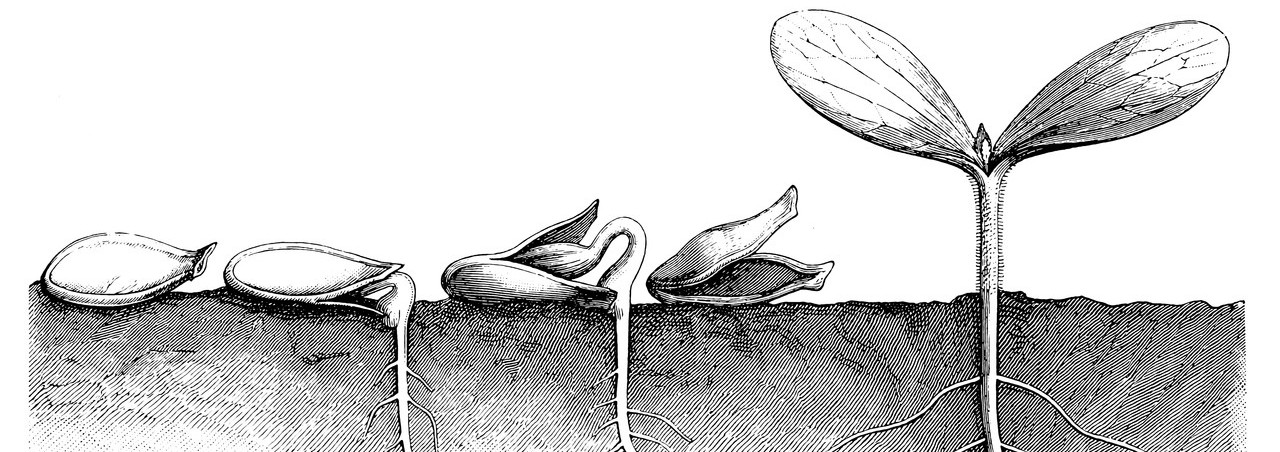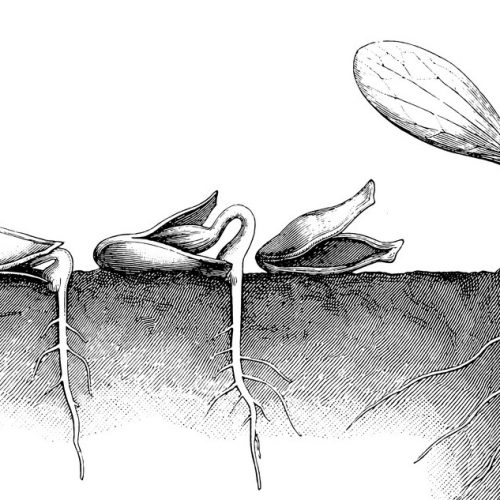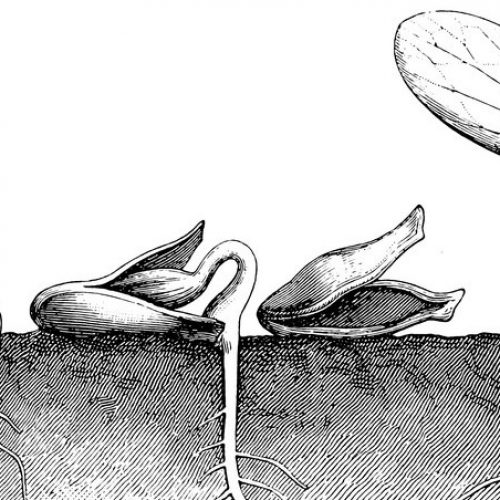If I was going to throw a dinner party and could invite three writers living or dead, who would they be? Djuna Barnes, Elena Ferrante, and Ruth Moore. Or maybe Wanda Coleman, Stanley Crawford, and Ruth Moore. Or Diane Seuss, Marcel Proust, and Ruth Moore. Ruth Moore makes my list every time for several reasons. Chief among those reasons is that a bumper sticker declaring “I Read Ruth Moore” was one of the first conversations I had with the woman who would become my wife. I’d just moved to Maine and had never heard of Moore, and my would-be wife was in the process of buying every copy of Spoonhandle she could find from yard sales and library book sales. It was love at first library book sale.
If you know Ruth Moore (1903-1989), you probably know her fiction. Her most beloved 1946 novel, Spoonhandle, is based upon Moore’s familiarity with the Gott’s Island fishing culture she grew up within at the turn of the 20th century. The book hung around the New York Times bestseller list for weeks and today is considered a classic of Maine literature. However, in the excellent documentary about the writer, I Have Seen Horizons, Moore’s niece and literary executor, Emily Trask-Eaton, said that it was poetry that Moore really cared about, but she just couldn’t make a living doing it. Sadly, who can? Now, we have the opportunity to peer into the poetry mind of this beloved writer. Islandport Press has re-released two books of Moore’s poems: Time’s Web (originally published by William Morrow in 1972) and The Tired Apple Tree (originally posthumously published by Blackberry Books in 1990).
Moore’s political and environmental convictions still feel pressing, perhaps even more so. “Come All Ye Murderers, All 1971,” included in Time’s Web, is a pointed poem against the practice of clear-cutting trees by developers, ending with the chillingly simple observation that “all the king’s men” and their myriad technologies “cannot put back one tree to grow upon its roots again.” In The Tired Apple Tree, there’s the pithy “Inscription for an H-Bomb.” In its entirety:
Here am I
Who have smashed all your microscopes.
I have brought you perpetual winter;
But give me credit –
I have also cured your hatred forever.
The dark humor in this poem, especially in the cackle of smashing “all your microscopes,” courses through the two books. As she displayed in her novels, Moore had an equally fine ear for the poetry of everyday speech.
In “Reference List” from The Tired Apple Tree, a boy responds unenthusiastically to the prospects of his mother’s chicken dinner that night: “I won’t eat it. I thought you were / going to have something nice. Like hot dawgs.” All the items on Moore’s “Reference List” were gathered from her immediate environment in Bass Harbor, Maine. “Tourist, 1971,” from Time’s Web, is another poem that takes place “beside [her] garden fence.” The speaker encounters a weary man on holiday with his family, the kind of man exhausted by the amount of fun he’s supposed to be having “on the assembly line of his vacation.” The man has seen the Howard Johnson’s and the Lighthouse, and they have exhausted him. A reader can also feel Moore’s exhaustion with the tourist grind. The man and the poem’s speaker share a desultory moment, each wearily locked in their roles of lost tourist and direction-giving local; it’s the brief sliver of a shared empathy that shivers between them that animates this poem. Both poems, each from different books and spanning decades, offer a poignant long-exposure photograph of Moore’s Bass Harbor life in the late twentieth century as the community struggled to keep a hold of its character in the face of the rising tide of the juggernaut tourism economy. Anyone who has tried to navigate Acadia National Park in July knows what I’m talking about; Moore’s two collections allow us to see this problem spread and grow in nuance and severity over the last fifty-some years.
The looming presence of the sea is what truly stands out in both collections. From The Tired Apple Tree, there’s the epic, “Little River,” in my opinion, one of the most haunting sea poems ever written. For a truly worthy interpretation of the poem, look up folksinger Gordon Bok’s song version, which brings the poem’s deep vein of melancholy to the fore. The poem is remarkable in its light touch, a near elliptical portrayal of heartbreak and the speaker’s fierce adherence to the sea, and yet her equally fierce desire to be called back home.
Little River lighted-whistle
Cry no more.
Sleepy sound from the breakers calling me
Back to shore.
Whistle it soft to the silver river,
Whistle it loud to the drumming sea.
Whistle it low to the moon and morning.
Not to me. Never to me.
The poem aches in its essential paradox—the speaker hears the “sleepy sound from the breakers,” which calls her back to shore, and yet in the next stanza, she rebuffs it—do not whistle to me, never to me. Or in other words, I hear your calling, but I am not coming. Why doesn’t she come home? The reasons are not especially clear, though deeply felt, and it seems the speaker is more devoted to the sea than anything else, even the girl who thought she was the one.
Moore was not a fan of any sleight-of-hand poetry nor avant-garde aesthetics. Hers was a plain-spoken poetry, and sometimes it’s this direct delivery that can get Moore dismissed as “regional” or unsophisticated. Dear reader, do not make such a foolish mistake. There is much richness, and often humor, in Moore’s plain-spokenness. Nowhere is this more obvious than in “To a Contemporary Poet” from The Tired Apple Tree, in which Moore, tongue-in-cheek, berates an unnamed contemporary poet for giving poetry a bad name: “If sentences butt together / Like cats on a parlor mat, / I struggle to get your meaning / Whether it’s this / or that?”
Moore was no avant-garde poet, nor was she any sort of confessional poet. These poems are personal, but only up to a point. There’s a curtain around Moore’s inner life that almost feels walled off in comparison to some of today’s contemporary poetry that seeks authenticity through an examination of the self’s deepest secrets. As an example of these omissions, nowhere in these poems (other than the dedication page of Time’s Web) is Moore’s life-long relationship with her partner, the writer Eleanor Mayo, and Moore doesn’t use as a subject the building of their house by hand in Bass Harbor. Moore lived an unconventional, remarkable life in many ways—successful professional novelist, lesbian, childfree—and she did it all in the midst of the rural fishing community where she grew up. A reader might well wonder how she did it and what transpired behind that curtain. However, Ruth Moore was a devotedly private person, and she would not like this reviewer prying into what she purposefully did not include in her poetry. I can’t help but wonder about some of these mysteries. But Ruth Moore only shared those secrets with the sea.

View the Ruth Moore Collection at Islandport Press.

Jefferson Navicky
Jefferson Navicky is the author of Antique Densities: Modern Parables & Other Experiments in Short Prose, which won the 2022 Maine Literary Award in Poetry, as well as the story collection, The Paper Coast, and the poetic novel, The Book of Transparencies. He is the archivist for the Maine Women Writers Collection. He lives in Freeport, Maine.




